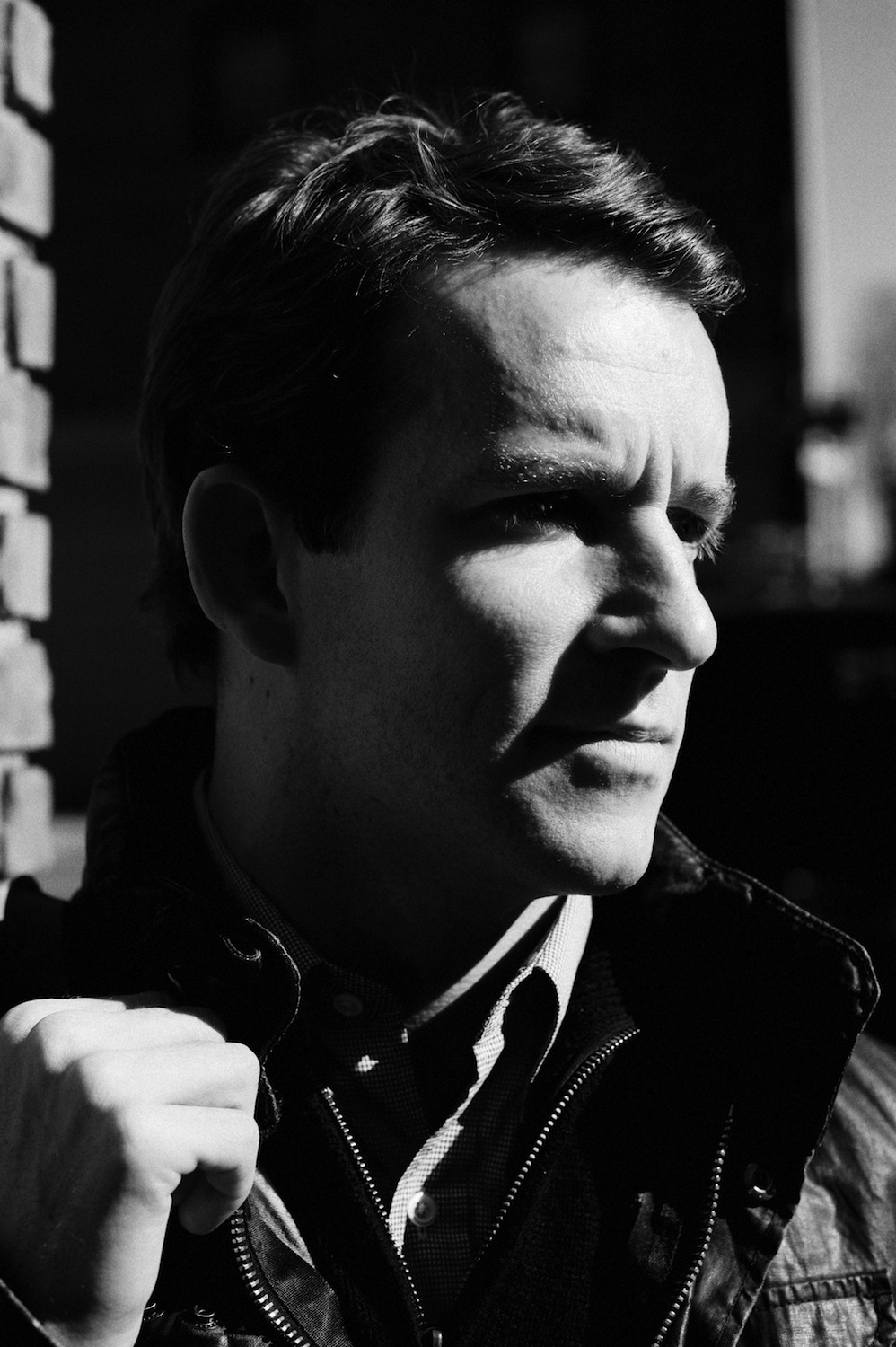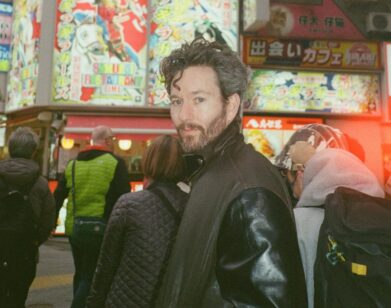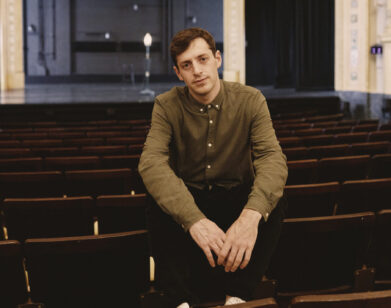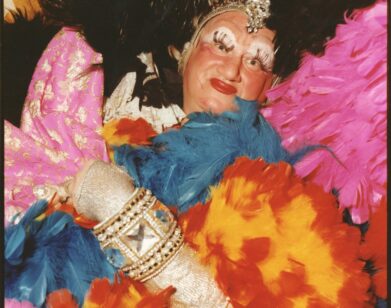Bill Clegg Lived to Tell
In literature, New York is so often portrayed as the city of self-destruction and endless descent. Much great writing has been devoted to these dark rip tides awaiting their not-entirely-unwilling victims. Bill Clegg’s first memoir, 2010’s The Portrait of an Addict as a Young Man, was perhaps the most recent, breathless example of this genre: an epic story of crack consumption that went deep into the hell of addiction that was captured in a phenomenally immediate voice and with an unflinching honesty.
Although Portrait of an Addict ended with a very broken Clegg being admitted into an inpatient facility, the horrifying journey down (only pages earlier he was trying to die by overdose in a hotel room) led many readers to wonder how Clegg managed to survive. If they had flipped their copies over and scrutinized the author’s photograph on the jacket, they would have seen that he had survived quite nicely—the handsome 40-year-old is a top literary agent at William Morris Endeavor. In his second memoir, Clegg addresses the intervening period, between those first tentative steps to recovery and the man he is today, a sober, centered determiner of many writing careers (full disclosure: he handles mine). Ninety Days, out this week, tracks Clegg’s return to New York, only one month sober and highly vulnerable, and like Portrait of an Addict, he drops the reader inside the mind of a man desperately hoping to stay clean, navigating a city that once was so hospitable to his urges, and finding a community of road-sharers who he learns to trust and shoulder.
A lot can go wrong with a recovery memoir, but Clegg has a direct, spare style and an engaging voice that is reminiscent, at least to me, of Jean Rhys in her fictional addiction book Good Morning, Midnight. It is because of this immediacy that Ninety Days turns out to be such an exhilarating story of ascent, and New York a city of survival strategies.
I met up with Clegg at his favorite downtown restaurant to discuss the hard work of writing on the upward trajectory and why it’s never safe to holiday in Thailand.
CHRISTOPHER BOLLEN: Was Ninety Days harder to write than Portrait of an Addict as a Young Man? I imagine it must have been in the sense that, in terms of plotting, the story of going down the drain is always more spiraling and sensational than the story of climbing back up.
BILL CLEGG: I didn’t find it more difficult to write about recovery, partly because the landscape of the people surrounding me is very much the same as it was in the last book. They’re all addicts and alcoholics. It’s just that in the first book all of the addicts around me are using. In the case of recovery, the addicts are either sober, in recovery, or relapsing.
BOLLEN: At one point in the book you say that you physically and emotionally need to be around addicts—that in a way your recovery depends on being around them.
CLEGG: I absolutely do need to be around them. There is a scene at the end of Ninety Days when I’m in Thailand on a small island and that was the first time that I had been away from my regular meeting for longer than a week. I go to the same meeting every day. And it’s the same meeting I describe in the book.
BOLLEN: There’s a great observation at the beginning of the book where you’re just starting to attend meetings and you can’t figure out how these people find the time out of their busy schedules to meet in these rooms everyday. I often wonder that.
CLEGG: When I think of all the time I dedicated to getting drunk and high, it was a hell of a lot more than an hour a day. Especially when you factor in the scoring, the using, and the aftermath. All that took the better part of a day. Also it’s not like going to the dentist or the doctor. I love the meetings. I adore being connected to so many riveting narratives. There’s a core group of people that go to my meeting on a regular basis. They’re involved in the drama of living. And life is interesting in these meetings. You’re connected to all of these narratives that you return to every day. There’s a similar urge there to reading novels.
BOLLEN: I have a theory about alcoholics, gay men, and writers. They have all learned to be amazing liars. They’d had to simply to get by. And because of that they’re champion storytellers. Alcoholism and homosexuality are two schools of fiction writing.
CLEGG: Homosexuality and active alcoholism and addiction often require, for a period of time, an enormous amount of fabrication—covering your tracks. I never thought of it that way before, but you’re right. And the distance you create between you and the world because of that is very difficult to dismantle.
BOLLEN: The recovery meeting is a place, as you say, for all of these colorful narratives. But, from an outside standpoint, much of the language of recovery has become codified, and it almost seems like addicts begin to speak exactly the same—using the same words and sentences to describe their addictions. Did you have to make a conscious decision to write about recovery that didn’t fall into recovery jargon?
CLEGG: The truth is that the details of addiction and alcoholism—the rooms in which the addiction or alcoholism happens, the clothes that people are wearing, and the accents they might speak in—may be very different. But the actual experience has many similarities. There’s a pretty narrow storyline for all of us: it’s fun for a while, then it’s fun with consequences, and then just consequences. The drinking and the drugging become less and less manageable until, at some point, whether by choice or by force, somebody enters the room of recovery, and they either get sober or they don’t. Or they die. The variety comes in the way people tell that story.
BOLLEN: Bret Easton Ellis tweeted when he was reading Portrait of an Addict something like “why do all addiction books have to end with the author’s recovery?” Of course, one obvious answer is that, if they don’t recover, they’re dead and can’t tell the story.
CLEGG: Yes, because that’s the nature of alcoholism and addiction. I can really only speak from my experience, but, in Portrait as an Addict, at the end of the book, I tried to kill myself in a hotel room. I thought that I’d die of an overdose, that somehow death would happen through the excess of using, staying up, and drinking. My narrative was very accelerated, where for others it may be a slower turn into darkness and depression. Sometimes people arrive at that despair and find that they have nobody left because they’ve alienated everyone around them and lost their jobs. So when the question of why all addiction stories end in recovery is asked, well, first of all, not all of them do. But if it’s a memoir of addiction, then it’s somebody’s experience. They’re usually only able to tell the tale because they lived through it. And if they lived through it enough to write a book, then they probably got sober. For as many addiction memoirs as there might be, there are thousands and thousands and thousands more stories that have ended in death or ended in an ongoing act of addiction or alcoholism that made it not possible to write.
BOLLEN: Yes, it’s hard to imagine you in that hotel room completely high on crack and also managing to scribble down your memoirs.
CLEGG: I couldn’t even cross the street, let alone write a book!
BOLLEN: The character of New York City obviously appears in both books. It’s two very different versions of the city, night and day, and yet they do overlap. In Ninety Days you mention places, corners, and streets that you literally can’t walk down because they have too many memories or triggers. They are almost haunted for you. All of us who have lived in New York for a long time have these haunted corners or buildings, but in your case these ghosts could actually come out and drag you back down a dark alley.
CLEGG: [laughs] And into the building. After treatment, in coming back to New York, I had returned almost to a battlefield that still had smoke rising from the ashes. I don’t go into apartments where people are using crack anymore, but the places where I had were initially off-limits to me. I had a sponsor who helped me map out the places in the city that were triggers, places where I did drugs or that had a lot of emotional baggage. Like the literary agency I had co-owned and that was now shut because of my using. Or the apartment that I lived in with my boyfriend. I had a map and I was not allowed to go near these places. And the few times that I did without telling anybody, I picked up. There’s the moment in the book where I sell some silver of my mother’s to get money which I thought was going to be for rent but which turned out to be for buying crack.
BOLLEN: There’s the scene at the bank where you remember all of the money falling out of your pockets and blowing around in the wind, and you can’t control your body enough to collect it.
CLEGG: I still pass that bank, and I remember that every single time. When I went within a block and a half of our old agency, it was an incredibly painful place to re-arrive at so soon after everything had fallen apart. I picked up that night. Here I was in my mid-thirties, I had guided people’s careers for a living and had owned real estate, had lived my life and been successful in some ways. And then suddenly I had a kindergarten map of Manhattan and there were certain zones I couldn’t walk into. It was like being treated like a kindergartener, and I didn’t like it. But I was frightened enough to follow the suggestions for the most part. And if I didn’t follow the suggestions, and picked up or bumped into some hard consequence, then I learned the lesson at the speed of pain.
BOLLEN: In Portrait of an Addict, you go into great detail on what the drugs did to you and how far you were falling. In Ninety Days the relapses aren’t painted with so much description.
CLEGG: Well, the relapses that I had were comparatively brief. If you compare my using—like in Portrait of an Addict—I had described a solid period of two months that I was using crack, and there was so much that happened in that time. In the period that I’m describing in Ninety Days, I had a handful of relapses and they didn’t last longer than a day, a day and a half, two days. So what went on was much more limited. It followed a very predictable pattern. And I think after the first relapse, which I do describe in detail, the ones that followed were very similar. For the purposes of this book, I felt I went in to detail enough and there wasn’t much more to say about them honestly. Also, the purpose of the book is recovery. And the truth is that my experience of those relapses was as painful speed bumps on a road going somewhere else. If, in the first book, the road was going someplace really dark and the car just kept moving faster and faster, in this book the journey has a bunch of stops and starts but it’s actually all going in a brighter direction.
BOLLEN: Have you felt any trepidation about becoming something of a poster boy of sobriety? Sometimes that attention can be really difficult: the new face of addiction.
CLEGG: I think before I got sober, I suffered from an excessive self-consciousness, sometimes an agonizing self-consciousness. So publishing the book was a great relief for me, mainly because I had suffered under the weight of so many secrets for so many years. So finally coming clean about all the things that I never imagined being honest about was such a relief. And it did prove a strange mix of my work life and private life. I was somebody who was an active alcoholic and an addict. It sort of puts almost everybody in my life on alert that that’s who I am and that’s where I’m coming from.
BOLLEN: Finances play a big part of your thought process in the book. So many people with problems probably feel that they should check themselves into rehab but they don’t have the money for it. Rehab often seems like a place for rich people who can afford to go missing for a solid month from their lives. I like the fact that in Ninety Days you are horribly worried about money.
CLEGG: I was over half a million dollars in debt after I came back from rehab—with legal bills, shrink bills, rehab bills, settlement agreement, bills with my former business partner…
BOLLEN: So why did you come back to New York? It seems like the city would be one gigantic trigger, with the Empire State Building like a syringe.
CLEGG: I didn’t know until right before that I would come back to New York. I had this panic moment in rehab. Some people describe spiritual experiences in recovery but I had this existential experience that everything was going to be okay. And that it would be okay in New York. And that it was my home. The people who were closest to me were here supporting me. I went where it was warmest. There’s a phrase that people in recovery use all the time, which is “one day a time.” I sort of lived one minute at a time here for the first couple of months. I had no idea I would be able to actually stay in this place which seemed only for the rich, only for the much loved, and only for the comfortable. And I was none of those things. [laughs] So I felt like every day was a miracle that I was here. And I knew that there would be triggers everywhere in New York. My relapsing had a lot to do with the fact that I was in constant walking distance of drugs. I knew how to secure drugs here. Just being able to score drugs is like 80% of the challenge.
BOLLEN: So have those memories or triggers finally disappeared for you in New York? Can you walk wherever you want now?
CLEGG: There are certain lit windows of apartments that I pass now and that I used to be in, doing drugs. I will look up from a passing cab and have a surge of feelings. I see them every week. There’s not a week that passes where I don’t see one. In some cases, I can still see blankets that were nailed over the window so I know it’s the same people. I’m shocked that they’re still alive, or that they haven’t been arrested. I’m shocked that it’s still going on all these years later. And it breaks my heart. I have a lot of compassion for those people because I was there. They are me. I am them. We’re the same. I just happen to be sober in a taxi cab passing by and they’re inside using. And you know, it’s a very thin nerve that keeps me from being up there with them.
BOLLEN: When I think back to how I grew up, drugs and alcohol were a major fascination among my friends so early on. It was such an obsession that some of us were practically doomed to have problems as adults.
CLEGG: When I was 12 years old, I was always thinking about filling this little orange thermostat with my dad’s booze and bringing it up to my bedroom. When I was in high school, getting pot was all I thought about, driving to this town, or that parking lot.
BOLLEN: We would park outside of a gas station and the prettiest girl with us would stand in front of the store asking any single man coming in or out if they’d buy a six-packs for her. That’s how we got beer. We basically prostituted attractive friends.
CLEGG: We would drive an hour and a half in the general direction of drugs and hope we bumped into it. College was the same thing, but then it expanded into other things like coke. And then in New York it was crack and having a drink at the end of the day. It’s amazing I got anything done during any of that period. I just read Ninety Days for the audiobook. And during those four days in the studio reading and not particularly liking the sound of my voice, someone asked me if there was anything I wish I had put in the book that I didn’t. And actually there is one thing I wish I had put in there, one sentence, which is, “If I can get sober, anybody can.”
BOLLEN: And what about your poor cat Benny? She makes cameos in both books.
CLEGG: Benny is 18 years old, fat, chubby, shiny… She looks better than I do after all these years. She’s wearing well.
BOLLEN: Did you read other addiction or recovery memoirs before you started writing?
CLEGG: The only addiction memoir I ever started reading was the one I described in Ninety Days, and I didn’t get very far because it had a general sense of fraudulence. It felt like a tall tale. Like, when you hear somebody at a cocktail party and they’re telling some tall tale and you just tune out because there’s just something that doesn’t ring true about it. That’s what I did with that book. I tuned it out and put it down. But I think that book was damaging because it made addicts believe that they could get clean on their own without support. And claiming that is the truth when it’s fiction is damaging. It created a false allusion for people trying to get sober that I think is irresponsible. So I didn’t read any addiction memoirs, no.
But I did read a lot of memoirs, like Ian Frazier’s Family, which is a masterpiece. Or William Kittredge’s Hole in the Sky, which has a lot of alcoholism in it and is one of the most beautiful books in my opinion. I also represent memoir. Nick Flynn’s Another Night in Bullshit City and Brad Land’s memoir Goat, about a young man who goes to Clemson University to pledge a fraternity that his older brother is in, are two of the most powerful memoirs I’ve read. I actually had long discussions with Nick about writing. He told me that somebody had given him the advice that the things that you feel the most uncomfortable about will probably be the most useful to a reader—and it will signal that you can be trusted. So anytime I got queasy or squeamish about something I was writing, I tried to lean into it and not away.
BOLLEN: There seem to be so many options out there for people trying to get sober. I have a friend who attends online meetings. I don’t know quite how that works, but I guess it does for him.
CLEGG: There are so many ways you can connect to other alcoholics and addicts. My recommendation is for people to try all of them and see which one works best for them. I found one because somebody came to a psych ward and said, “I’ll be your sponsor in the program that I’m in,” and I was like, “Okay.” So I just followed him into those rooms, but there are other rooms and other ways.
BOLLEN: Just not trips to Thailand.
CLEGG: Yeah, I don’t recommend islands, at least not without meetings of any kind. That didn’t work for me.
Christopher Bollen’s first novel, Lightning People, came out in 2011. He is the editor at large at Interview.







